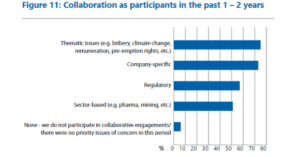The 2022 report by the FRC in the UK, “The influence of the UK Stewardship Code 2020 on practice and reporting”, shows a stark contrast between the virtual absence of collective engagement in Japan as compared to the UK. A large proportion of asset managers in the UK are participating in a variety of collaborative engagements:

Some Quotes from the FRC’s report:
“Most respondents identified collaborative engagement (working with other investors) as an increasingly important escalation tool.”
“One of the things about collaboration is you don’t have to do all the work yourself. You are adding the value of your assets to the engagement and hopefully sending a better signal – that’s quite a lot of change in the sector in dealing with [ESG] issues.” (Head of responsible investment, large UK asset owner)
“Collaborative initiatives organised by bodies such as Climate Action 100+, the Investor Forum, International Corporate Governance Network (ICGN) or Principles for Responsible Investment (PRI) are the most frequently cited examples of collaborative initiatives by both asset managers and asset owners in the survey and interviews. In such initiatives, engagement work is typically spread out between different investors who share a common stewardship agenda. Investors also engage together to get better use of resources. Some respondents also noted that PRI provides a helpful structure for collaborative engagement, helping to establish some of the parameters around engagement and what is being achieved. Some of the asset owner respondents also take part in quarterly meetings of the UK Responsible Investment Roundtable, which brings together UK pension funds to discuss different challenges and opportunities.”
Compared to Japan, in the UK, there is far less stigma and burdensome reporting requirements for collaborative engagement (which is actually encouraged by the UK’s Stewardship Code), whereas Japan’s SC just says “it is one method”. As well, the Investor Forum has put forth a generally accepted “opt-out anytime” set of best practices for collective engagement.
Even so, nearly half of responding asset managers had some concerns about the practice:
“Despite acknowledging the increasing importance of collaborative engagement, nearly half of asset managers in our interview sample expressed reservations about joining collaborative initiatives, preferring an individual approach. Reasons cited included concerns around regulatory restrictions, effectiveness, competition between asset managers and reputational risks.”
“Interestingly, these issues were common to all asset managers regardless of size or domicile. Some interviewees expressed caution about joining collaborative campaigns, either because they are mindful of the campaign messages themselves or they are concerned about perceptions of or regulatory risk around market collusion. For example, a client relationship manager of one large non-UK asset manager mentioned that they are cautious not to appear to be in ‘collusion or acting in concert … as there is a problem that you violated a certain threshold for declaration of or notification of voting rights.’ ”
“Some asset managers were also worried about the relationships with the companies they have and are therefore cautious, so as not to antagonise company management.Reticence around reputational or legal risks was identified in both the survey and interviews. In the survey, two respondents raised concert party regulations and conflicts of interest as reasons for non-participation in collaborative engagement. Both firms were non-UK headquartered and both indicated that legal assurances about collaborative engagement would probably increase their levels of collaboration.”
To each his own.
Nicholas Benes
